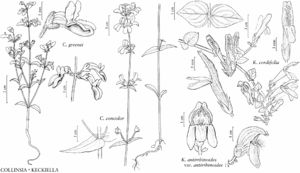Difference between revisions of "Keckiella cordifolia"
Brittonia 19: 203. 1967.
imported>Volume Importer |
(modify caly× to calyx) |
||
| Line 27: | Line 27: | ||
}}<!-- | }}<!-- | ||
| − | --><span class="statement" id="st-undefined" data-properties=""><b>Stems </b>climbing, 10–30 dm, glabrous or short-hairy when young. <b>Leaves</b> opposite; blade ovate, 20–65 mm, base rounded, truncate, or cordate, margins usually 3–11-toothed. <b>Inflorescences</b> panicles, glandular and hairy. <b>Flowers</b>: | + | --><span class="statement" id="st-undefined" data-properties=""><b>Stems </b>climbing, 10–30 dm, glabrous or short-hairy when young. <b>Leaves</b> opposite; blade ovate, 20–65 mm, base rounded, truncate, or cordate, margins usually 3–11-toothed. <b>Inflorescences</b> panicles, glandular and hairy. <b>Flowers</b>: calyx 7–13 mm, lobes lanceolate; corolla red to reddish orange, 31–43 mm, tube plus indistinct throat 18–25 mm, adaxial lip 11–21 mm; pollen sacs 1.1–1.5 mm; staminode densely yellow-hairy, included. <b>2n</b> = 16.</span><!-- |
-->{{Treatment/Body | -->{{Treatment/Body | ||
Latest revision as of 22:31, 14 January 2021
Stems climbing, 10–30 dm, glabrous or short-hairy when young. Leaves opposite; blade ovate, 20–65 mm, base rounded, truncate, or cordate, margins usually 3–11-toothed. Inflorescences panicles, glandular and hairy. Flowers: calyx 7–13 mm, lobes lanceolate; corolla red to reddish orange, 31–43 mm, tube plus indistinct throat 18–25 mm, adaxial lip 11–21 mm; pollen sacs 1.1–1.5 mm; staminode densely yellow-hairy, included. 2n = 16.
Phenology: Flowering May–Jul.
Habitat: Chaparral, forests.
Elevation: 0–1500 m.
Distribution
Calif., Mexico (Baja California).
Discussion
In the flora area, Keckiella cordifolia occurs primarily in the South Coast Ranges, the San Bernardino Mountains, the Peninsular Ranges, and the Channel Islands. It grows in wooded, riparian habitats and is the most mesic of keckiellas.
Individuals with yellow corollas are presumed to be mutants in which the red anthocyanins are not expressed. Individual plants may develop as weakly sprawling to climbing shrubs. The relatively long stems are not self-supporting.
Selected References
None.
